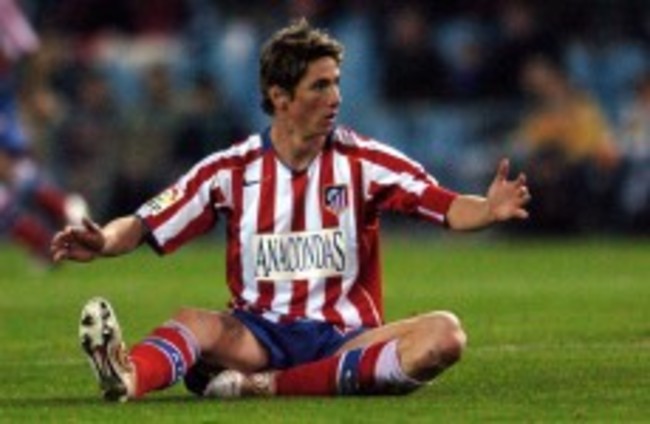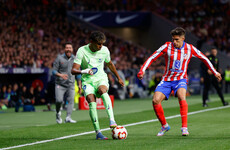IT SAYS A lot about Fernando Torres’ travails that much of the build-up to Chelsea’s Champions League semi-final against Atlético Madrid has been focused on Thibaut Courtois.
Amid contract clauses and the ethics of the loan system, the fact that the 30-year-old is to return to his boyhood club for the first time since departing for Liverpool in 2007 has been a mere afterthought.
Yet, given the recent form of Samuel Eto’o and Demba Ba, the reality is that Torres may not even get onto the field.
With Torres having missed Liverpool’s visit to the Vicente Calderón in 2008 due to injury, it could prove yet another cruel, and fateful, blow in the recent career of the Spaniard.
After all, this is the Fuenlabrada boy who spent 12 years at Los Colchoneros – having supported the club since the age of five – and became Atlético’s youngest ever captain at just 22 in 2006.
El Niño scored 91 goals in 243 games for Atlético’s first-team and Carlos Cantarero was the man who promoted the Spaniard at the age of 16 in 2001.
“For his age, Fernando was a very mature boy,” Cantarero told TheScore.ie. “He knew what he wanted and where he wanted to go. In fact, the very first day we invited him to train with the first-team, we had a five-a-side in a very small space and he scored a few goals. The day after, we repeated the exercise and he did it again! It must be stressed that most of Fernando’s teammates were internationals, but nothing frightened him in training. He trained with the maturity of a veteran and the joy of a young man.
“There were signs there that indicated what he was to become. His innate qualities were very good and we knew that if he went through the right and proper progression, he would become a great footballer. From the outset, it was clear that he would become the footballer that he went on to be – I have no doubt about that. He was a player that, regardless of his ability, had something that was different from the rest. That was his best quality.”
Even though Torres shared a dressing room with international players, this was a very different Atlético side to the one going for a La Liga/Champions League double this season.
Saddled with debt and languishing in mid-table in the Segunda Division when Cantarero took over, promotion looked increasingly unlikely for Los Colchoneros.
To the Spaniard’s credit, Cantarero led Atlético to fourth place and the semi-finals of the Copa Del Rey.
“They were two very different times. At that time, the club needed promotion into La Liga and had already had two coaches by the time of my arrival mid-season. When I took over, the situation in the league was bad and we were a long way away from the promotion places. But, what the club had, just like today, was superb fans. For me, they were the best fans in the world.”
One of the rare highlights during Atlético’s season was Torres’ long-awaited debut, which came against Leganés on 27 May 2001.
Without exaggeration, it was the day that changed Atlético’s recent history – with the club having failed to produce a quality striker since letting a 16-year-old Raúl go in 1992.
Cruelly, the move was only triggered by the club having to close their cantera in a cost-cutting measure, but Raúl ended up spending 18 glorious years at bitter rivals, Real Madrid.
“It was more than pressure to play Fernando; it was the dream of everyone – fans, club and press – to see Fernando promoted into the first-team. But, one of the things I’m most proud of – when it comes to Fernando – is that we gradually introduced him and eased him in before he played full games. In that sense, I was not driven by the pressure and desire of those outside the club. I was doing what was best for Fernando and the team.
“It was a strange debut, because we were drawing 0-0 and I called Fernando over. There was not much time left and right when we were going to bring Fernando on, José Luque scored. I told Fernando that we were going to delay the substitution, so he continued to warm up. Shortly after, I called him over and he made his debut with the joy of the whole world.”
While Torres making his debut was one thing, scoring his first senior goal for Atlético was a whole different matter.
In what was to become something of a trademark in the coming years for Atlético, a Torres goal was to decide a game.
“We were drawing 0-0 with Albacete and I decided to make a change in the second-half. I took off Kiko – the idol of Atlético in those days – and replaced him with Fernando, the new idol. Not only was it a tactical change; it represented a generational change and the baton was passed from one idol to another. At the end of the game, Paulo Futre, the sporting director, approached me and told me that Fernando’s goal was one of a forward, a real forward. He was right.”
13 years on, Torres has gone on to score 250 more goals for club and country – including goals in the Euro 2008 and Euro 2012 finals.
Open to the possibility of returning home this summer, with Diego Costa potentially moving in the opposite direction, Torres is sure to receive a positive reception if he plays on Tuesday.
“It is a certainty that Fernando will get a warm reception. At just 19, he was the youngest captain in the history of Atlético. Fernando assumed huge responsibility at a very young age and fulfilled his potential. He always had exemplary behaviour on and off the field. Fernando is a huge part of the club’s history and has always been very important to Atléti. He will get the reception that he deserves.”













A very good player. I hope we see him back in the LoI soon.
Good for pats